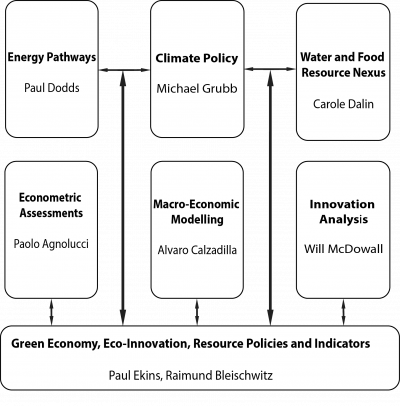The UCL ISR mission is to generate knowledge to promote the globally sustainable use of natural resources.
UCL ISR runs multidisciplinary teams, providing critical mass and capacity for large projects on topics of resource efficiency, circular economy, eco-innovation, and low carbon societies. It does this by employing its own staff and by acting as a forum and coordination mechanism for UCL staff in different departments.
It collaborates in particular with the UCL Energy Institute as part of the Bartlett School for Environment, Energy and Resources (BSEER) and with the UCL Circular Economy Lab (CircEL). On the teaching side, ISR manages a PhD programme and two MSc programmes.
The ISR research strategy evolves around seven interconnected areas, which aim to structure and strengthen our expertise.

Green Economy, Eco-Innovation, Resource Policies and Indicators: This is seen as strategy area and platform for our striving towards excellence throughout UCL ISR. We do decoupling analyses based on a number of indicators (MFA, LCA, footprints, etc.) and will compute a full ‘sustainability gap’ (SGAP) indicator for the UK and other EU countries. Over time ISR seeks to develop a new perspective on the economics and policies of resources and materials, with resources being appropriately valued and accounted for, more equally shared, and maintaining their value for longer, as will be required for the attainment of the Sustainable Development Goals.
Facilitators: Paul Ekins, Raimund Bleischwitz
Within this broad context, ISR does research on the following key topics:
Climate Policy: Climate policy requires rigorous analysis of electricity markets and of transformations of entire economies. ISR engages in research on financing low carbon economies with a specific angle on behavioural economics. It is also involved in research comparing the results of the Paris Agreement and assessments of national commitments. This will result in improved evidence on how actors engage and how the climate policy ought to be improved over the next years.
Facilitator: Michael Grubb
Energy Pathways: While ISR collaborates with the Energy Institute at UCL, we do research on resource and energy sector interactions (e.g. waste management; circular economy; resources in energy models). UCL ISR leads the Resources and Vectors Theme of the UK Energy Research Centre’s (UKERC) third phase, with a focus on oil and gas, bioenergy and hydrogen. ISR also undertakes a holistic comparison of the relative benefits of energy storage, CCS, grid reinforcement, interconnection and demand-side response for system balancing. ISR also continues to do research on bioenergy. The expected outcome is knowledge about future energy pathways towards sustainable resources in the UK, EU, other countries and at international scales.
Facilitator: Paul Dodds
Water and Food Resource Nexus: The use of all resources is increasingly recognised as being interlinked, as conceptualized through the water-energy-food nexus debate. Particular efforts are being made to assess the environmental sustainability of global food production and trade as part of a NERC fellowship, focusing on agriculture’s interactions with land, climate and water. Further nexus analysis targets the interlinkages of energy and water. ISR pushes the boundaries of this debate through integrating minerals and land into nexus research; it will produce a Routledge handbook on the resource nexus in 2017. ISR will make efforts towards nexus coefficients, a global database and liaising with research on environment and security.
Facilitator: Carole Dalin
ISR is building expertise in the following methods:
Econometric Assessment: Econometric modelling and evaluation of energy and economic policies has been a long-standing research area at ISR. Research is being carried out on assessing the impact of future low carbon pathways and climate change on natural capital and ecosystem services. Other research is done on the impact of economic and climate shocks on price of traded commodities. Our research is based different branches of econometrics such as structural VARs, Kalman filtering and standard gravity models.
Facilitator: Paolo Agnolucci
Macro-Economic Modelling: ISR is developing macro-economic modelling tools to address resource interlinkages and future transformations at the global, regional and country level. Our Environmental Global Applied General Equilibrium (ENGAGE) model is based on up-to-date international trade data (GTAP 8) and has detailed modules on food, water, minerals, and energy. The model seeks to fill gaps on analysing policies and transition pathways. The efforts are being linked to other models such as the UCL Energy Institute’s energy system models TIAM-UCL (global), ETM (European), UKTM (UK), and system dynamics modelling. Over time we will extend the modelling to track and project progress towards the SDGs (poverty eradication, nutrition measures etc.), and various footprints.
Facilitator: Alvaro Calzadilla
Innovation Analysis: ISR is increasingly recognized as international centre for comparative eco-innovation research, spanning the levels of technologies, industries, countries, the EU, and international approaches. We do rigorous data analysis, innovation systems analysis, impact assessments, scoreboards, network analysis, and are involved in participatory approaches. Our methodological advancements address new ways of evidence-oriented analysis, expert involvement, and learning tools. One of the aims is to contribute to the development of a global resource dashboard and a sustainability rating agency for countries, key industries and relevant consumption areas.
Facilitator: Will McDowall
In addition to those areas ISR explores topics:
- Energy, Resources and Development, especially on land use in the global South (contact: Julia Tomei).
- Urban transitions, especially towards a circular economy (contact: Teresa Domenech).
- Resource futures, especially on transition scenarios and foresight methodologies (contact: Michal Miedzinski).
- Sustainable Finance (contact Nadia Ameli).
- Behavioural Environmental Economics Team (contact Lorenzo Lotti).
 Close
Close

